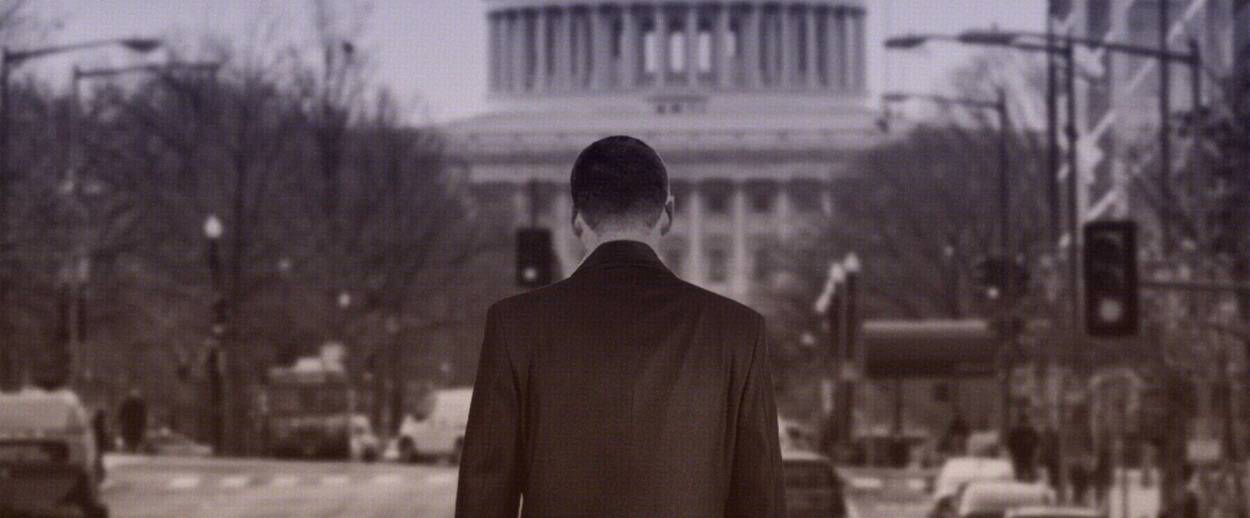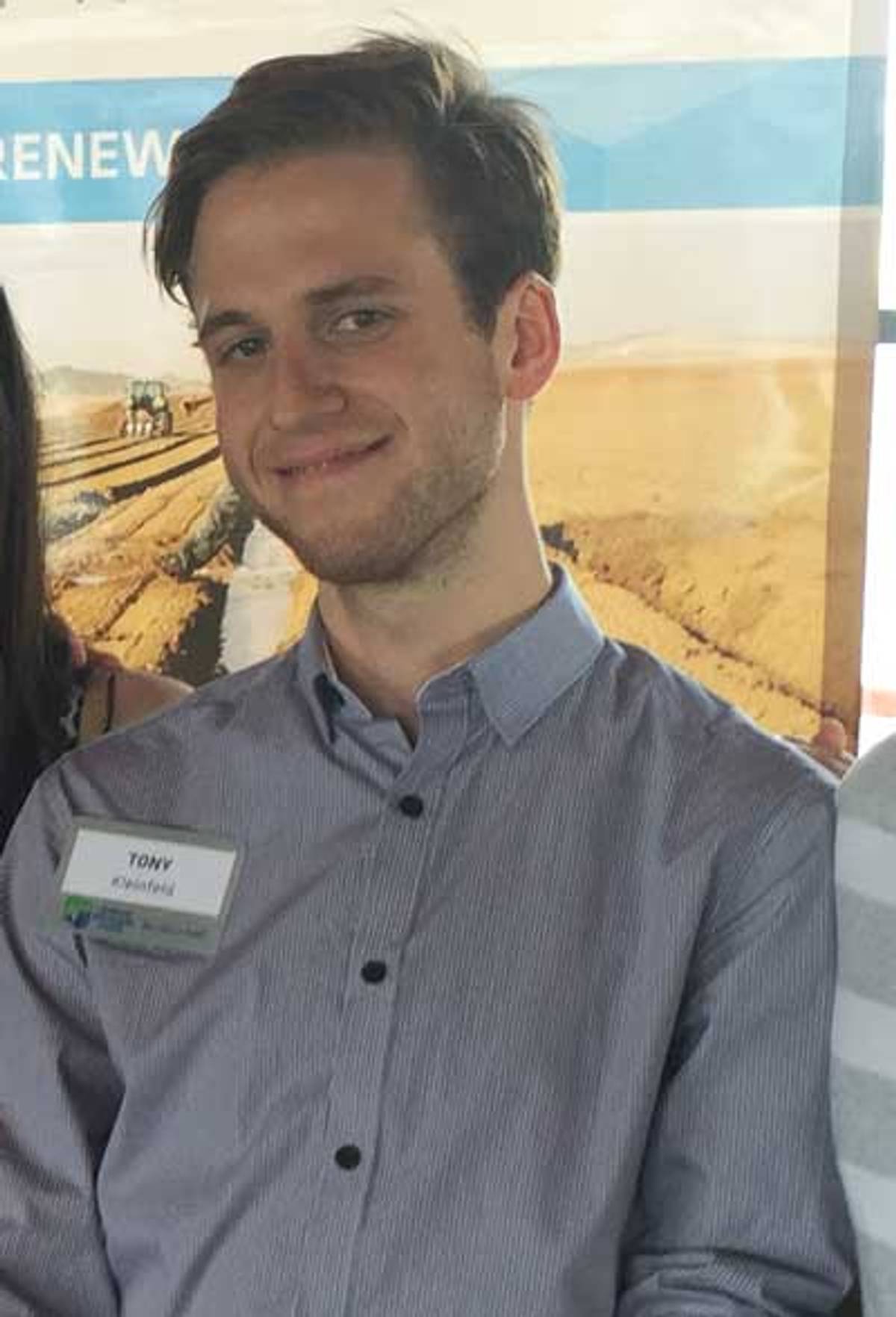Pro-Israel Hoaxer Hits DC
Did an anti-Zionist filmmaker from Oxford masquerade as his political opposite to get internships at lobbying outfits?




Last summer, a spritely presence enlivened the small and often dull circles of Washington’s Israel-advocacy community. A young man named Antoine Kleinfeld arrived from Oxford, where he was a student. He spoke with a tony North London accent and dressed crisply. He was fluent in six languages, including Yiddish and Hebrew, and regaled his new friends with stories about his hobby, international hitchhiking, which had taken him, he said, to 80 countries the world over.
It was precisely the sort of pastime, costly and eccentric, for which the British upper classes are known, and Kleinfeld, true to form, seemed the perfect gentleman, throwing parties in his lavish apartment and ingratiating himself by sending thoughtful notes and text messages to everyone he met. Over several months, between June of 2016 and January of this year, he cultivated a relationship with several pro-Israel organizations in D.C., becoming one of the town’s best-liked Zionist activists.
There was only one problem: Antoine Kleinfeld isn’t a Zionist. He isn’t even Antoine Kleinfeld. His name, several sources have told Tablet, is James Anthony Kleinfeld, a pro-Palestinian filmmaker who, it seems, embedded himself with the Washington pro-Israel crowd, surreptitiously filming his new associates there in the hope, presumably, of producing a movie—or at least viral clips—that would publicly embarrass them. He has now disappeared.
Secret videos have been used as a weapon of political warfare since at least 2009, when right-wing activist James O’Keefe secretly shot and edited a clip that appeared to incriminate ACORN employees in illegal activities. O’Keefe was later forced to apologize to his targets and pay a $100,000 settlement, but the tactic he unleashed, fortified by the internet’s speed and power of dissemination, has grown stronger since. Earlier this month, it was used to great effect by Qatar’s state-sponsored network, Al Jazeera, against Shai Masota, a junior diplomat in the Israeli embassy in London who was caught on tape boasting to a British parliamentary staffer that he could bring down anyone he pleased if he or she failed to support Israel. Masot was forced to resign.
Still, 15 minutes of internet fame hardly seems worth the effort Kleinfeld put in, spending months of his life under a new and meticulously fabricated persona to infiltrate pro-Israeli groups in D.C.—which represent a smaller and less influential pool of organizations than those associated with other countries or political causes. One of Kleinfeld’s former mentors, who works for a large pro-Israel group, recalls taking Kleinfeld to a demonstration protesting the activities of Students for Justice in Palestine, a rabidly anti-Israeli group. No more than 30 people were present, the person recalled. “What you see here is the entire D.C. Israel lobby,” he remembered telling Kleinfeld, “If only we had the power our enemies say we have, we’d be so much better off.”
What, if anything, might Kleinfeld have caught on tape? His new friends told him about the work they were doing: briefing reporters, keeping up with ideological adversaries, and trying to persuade influential people to see complex issues their way, rather than their opponents’ way. But, as a number of sources familiar with Kleinfeld’s case noted, edited out of context, as most political hit piece videos are, even the dullest work can look nefarious.
“Everything looks bad when it’s secretly recorded through a cellphone,” said one official in an organization Kleinfeld targeted. “All Americans have the right to lobby the government, to write down what they think should be done, and to talk to journalists about the things they believe in. That’s true, even when these American citizens are Jewish.”
Kleinfeld’s bubble was burst by accident. Early in January, Al Jazeera began running a series of investigative stories called The Lobby, looking into the alleged influence of Israeli diplomats and activists around the world. The story of the Israeli diplomat Shai Masot was the series’ “smoking gun.” But while most of the footage was shot in London, one short scene that appeared toward the end of the report’s first episode was captured in a D.C. bar at an event held Aug. 2. It depicted a conversation with two British pro-Israel activists, who were discussing their organization’s sources of funding. An Al Jazeera article later referred to the person who had filmed those specific British activists as “our reporter.”
Watching the Al Jazeera documentary, several pro-Israel activists who were present in the bar thought back to that evening and realized there was only one person who could possibly have filmed it, and who appeared as a ghostly but recognizable presence in the background of exactly five frames: Kleinfeld.
***
Kleinfeld’s story begins in Europe, where he attended Oxford’s Keble College as a student of modern languages and linguistics. There, he became a frequent collaborator of the inflammatory anti-Israeli writer Max Blumenthal, who regularly compares the Jewish state to Nazi Germany and who was disinvited from speaking at the German Parliament in 2014 for opinions even many on the European left considered grossly anti-Semitic. With Blumenthal, Kleinfeld directed several movies, including one, which appeared in July of 2015, attacking the satirical French publication Charlie Hebdo for being disrespectful of Islam. He also belonged to an extreme London-based leftist group called Jewdas, which defines itself as dedicated to “radical voices for the alternative diaspora.”
Beginning in May of 2016, however, traces of James Anthony Kleinfeld began to disappear from the World Wide Web, while the profile of his faux-Zionist alter-ego Antoine Kleinfeld began to rise. That month, identifying himself as “a graduate student majoring in literature in a university in Paris,” he wrote a piece complaining about French society’s “pathological enmity toward the Jewish state.” Other such articles followed. In the Algemeiner, for example, he thundered against the BDS movement, asking “which other country upholds progressive values more than Israel?” In Washington, he fully inhabited the persona of an urbane secular European Jew whose Jewish and pro-Israel identity had emerged as he encountered virulent anti-Zionists during his university years. “Studying in Paris provided ample opportunity to engage with my fair share of Israel-haters and anti-Semites,” he wrote in one application to a pro-Israel organization in Washington. “It can be a frustrating experience to know that you are in the right but are not yet furnished with the facts and figures which can clinch the argument.”

With the stage now set, Kleinfeld arrived in America sometime in the early summer of 2016. In late June, he introduced himself to pro-Israel activists at a happy hour in D.C., which Kleinfeld learned about through Gather the Jews, a website and message board dedicated to Jewish life in Washington. Later in the summer, he attended an Israel advocacy “boot camp” run by Fuel for Truth, an organization whose mission is “to strengthen Israel’s image around the world by equipping young leaders with facts and historical analysis about the Middle East.” Ron Wasserman, Fuel for Truth’s chairman and chief education officer, confirmed Kleinfeld attended the organization’s program.
Kleinfeld, who was also registered in a nondegree summer semester at Georgetown University through July and August, began reaching out to the city’s various pro-Israeli organizations. Over the course of the summer and the fall, he set his sights on virtually every single pro-Israel organization in town, including the Israeli Embassy, Stand With Us, The Israel Project, the Foundation for the Defense of Democracies, the Israel on Campus Coalition, and Fuel For Truth.
Volunteering for one national pro-Israel group, in whose offices he’d spent a total of about 20 hours between late August and early October, Kleinfeld asked to help with fundraising—not traditionally an attractive field for younger volunteers. Wary of exposing a newcomer to sensitive donor lists and financial information, Kleinfeld’s supervisors proceeded with caution, allowing him to solicit small donations from a limited group of supporters. Kleinfeld proved extraordinarily good at his job. His accent and his charm, said one of his supervisors at the time, translated to $15,000 in donations for the organization, including a $1,000 gift from a person Kleinfeld courted in fluent Dutch.
At first, little about his activities struck his pro-Israel colleagues as suspicious. Like many others in the nation’s capital, he appeared to be an ambitious young striver who wanted to make his mark in activism or policy. “This is a city where there’s thousands of people doing the same thing he was doing,” someone who worked with Kleinfeld and was familiar with his social profile explained. “Nobody was particularly alarmed by that.” Washington is a ripe environment for precocious, career-minded young professions—part of the city’s attraction is the ever-present possibility of networking your way to a position of importance in your chosen field of advocacy.
But if his facility at such work was one part of Kleinfeld’s appeal, his passion for hedonistic play was just as notable. Residing in a two-bedroom condominium in Dupont Circle, Kleinfeld was known for throwing elaborate parties for his new friends and colleagues. The makeup of these parties, according to several sources, was always the same, bringing together American Jewish pro-Israeli activists and Israeli employees of the Jewish State’s embassy in D.C. Anyone interested in telling a story about sinister Israeli influence in America’s capital couldn’t have asked for a better guest list, and those who were feted by Kleinfeld were treated to large quantities of fine alcohol, far from the norm for most 20-something policy wonks used to plastic cups of flat beer.
His guests admired Kleinfeld’s generosity and his taste in art and books—the walls were covered with pro-Israel posters, and the shelves with tastefully selected tomes about Israel and the Middle East. Some, however, wondered how a person so young could afford such luxurious accommodations: According to the apartment’s online listing, it rents for $5,460 a month by a company called Attache Corporate Housing that specializes in letting short-term, fully-furnished apartments to businessmen in town for short stays.
His demeanor raised some eyebrows as well. “He was basically an intern, and he was asking me to have dinner and drinks with him,” recalled one activist. “I wouldn’t call him slick. He was just very earnest, and his earnestness was disarming, I think, to a lot of people.”
Another person who knew Kleinfeld decided to keep his distance from the young Brit after concluding his new acquaintance was becoming increasingly insufferable. “He was definitely overeager,” the source said, “to the point where toward the end of his stay here he was getting really annoying.” Kleinfeld, he added, had begun persistently asking about one organization’s long-term strategic planning.

At one Israel-related conference in late August, an employee of a pro-Israel organization was sufficiently concerned about Kleinfeld’s behavior to text a warning to another colleague. Kleinfeld, the employee said, was asking prying questions about legislation-related matters, and told the staffer that he was on the verge of being hired for a serious position involving global travel at another pro-Israel organization. The way he was asking questions, the person noted in text messages, was “strange.”
Al Jazeera’s “undercover” reporting on Israel advocacy in Britain set off alarm bells among community members who had known Kleinfeld as an anti-Zionist advocate at Oxford. According to sources familiar with these events, two British activists shared their suspicions with colleagues in D.C., occasioning the feelings one might expect: anger, betrayal, denial, and, in at least one case, panic attacks. One of Kleinfeld’s former colleagues confronted him via email shortly after the Al Jazeera documentaries aired in mid-January. Kleinfeld, who had thrown himself a going-away party at his Dupont Circle apartment on Oct. 1 but had stated his intention to return to Washington, never responded. He also stopped answering emails and phone calls from other former friends and associates.
Word spread quickly. Looking into Kleinfeld’s employment application, one organization discovered he had listed as his emergency contact Annabel Cohen, a prominent member of Jewdas. A more thorough search revealed photos of a man who looked a lot like Kleinfeld with Blumenthal. Other bits of evidence emerged, appearing to tie him to his previous role as James Kleinfeld, anti-Israeli activist.
Kleinfeld could not be reached for comment. Maybe it’ll turn out that Antoine and James Anthony—both Oxfordians, both fluent in several languages, both looking remarkably alike in the few publicly available photos—are somehow not the same person. Or maybe Antoine will reemerge soon to explain it’s all been a terrible misunderstanding, and he simply swung wildly from demonizing Israel to advocating for it, like a modern-day Arthur Koestler.
What’s known so far about Kleinfeld raises more questions than answers—about his own character and motives, and, perhaps more important, the motives and methods of the state-sponsored Qatari broadcaster that set off alarm bells in Britain and now in Washington. No one is totally safe or immune from the dangers of the new-media environment, where traditional forms of reporting, analysis and advocacy are being overwhelmed by custom-built echo chambers, fake news factories, and government-sponsored information campaigns. Stepping onto the playing field, at any age, means that you are now a target.
***
You can help support Tablet’s unique brand of Jewish journalism. Click here to donate today.
Armin Rosen is a staff writer for Tablet Magazine.